Update: After a long period, I am providing more information about the tuning.
Unfortunately, the
2260VKLR turbo isn't an ideal choice for several reasons:
First, it generates a significant amount of
backpressure. With the same exhaust configuration on Stevie's car, we observed a
difference of 700 to 800 mbar in backpressure while maintaining the same boost pressure on the intake side. We even reached
4700 mbar backpressure while trying to make
2,1 bar boost as the 2365 turbocharger.
In fact, running the same pressure as the
OM642LS version already reaches the
maximum allowable backpressure for the engine. Unfortunately, the
hot side is too small.
During testing on my car—with a
straight-pipe exhaust from both exhaust exits (which flows significantly better than a single-exit pipe)—only
1.8 bar of boost resulted in
4200 mbar of backpressure. This was with a
straight-pipe exhaust and a 3" downpipe.
This exhaust :
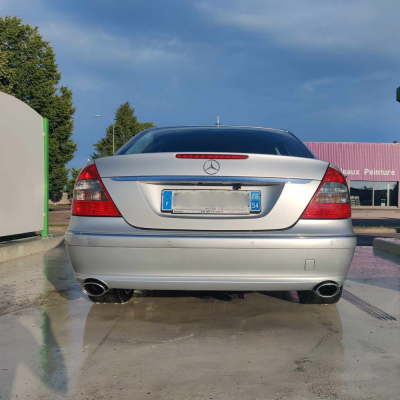

Regarding its
spooling capabilities, I wasn't able to make it spool significantly earlier than the stock
2056 turbo. In theory, it should, but the best I managed was reaching
2 bar boost around 1900-2000 rpm on the CLK.
It should be capable of achieving
1.6 bar at 1600 RPM in the
stock LS configuration. However, the issue lies in
boost pressure management within the
EDC16 ECU, which, for some reason, does not allow the pressure to build as quickly as it should.
This leads to the next problem:
constant overboost at partial load. With
stock PID settings and the
VNT preposition map, the
2260VKLR turbo remains in a state of continuous overboost.
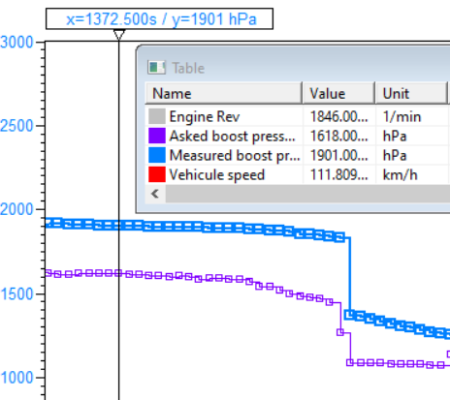
While driving at
110 km/h, the
overboost was consistently around
300 mbar higher than the target pressure. In theory, this should reduce fuel efficiency, but based on my measurements, that hasn’t been the case.
When attempting to lower the
VNT preposition to prevent the
VNT vanes from closing too much, I managed to
reduce the overboost. However, when the engine increased load
without increasing RPM—specifically while climbing a hill—the
boost pressure failed to follow the target increase, resulting in
underboost. In this condition,
fuel efficiency dropped significantly.
You can see this in the picture: the
purple curve represents the
target pressure, while the
blue curve shows the
measured boost pressure. The
VNT did not move correctly to follow the boost target desipite no PID has been modified.

Another issue arises during
full-load acceleration: the
boost pressure build-up is slightly delayed. Then, as the
VNT vanes close, the pressure builds too quickly, resulting in a
boost spike.
Due to this
overboost, the
VNT rapidly opens to bring the pressure back to target, but the correction happens too aggressively, leading to an
underboost. Since the
smoke maps are carefully calibrated, the drop in
boost pressure causes a slight
reduction in injection quantity, making the car feel hesitant.
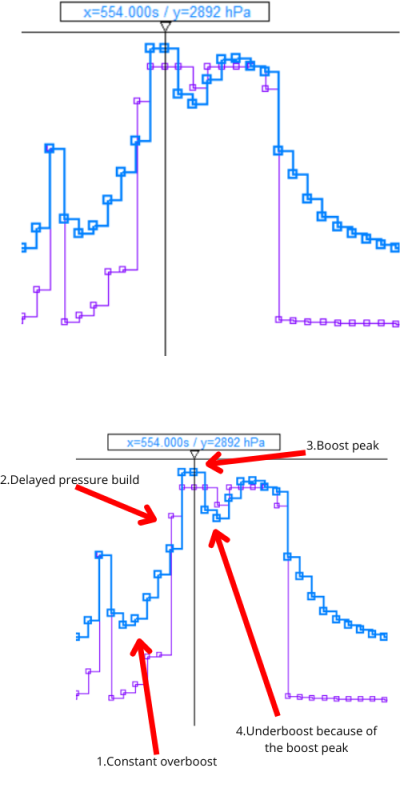
Here a very nice view of all the problems :
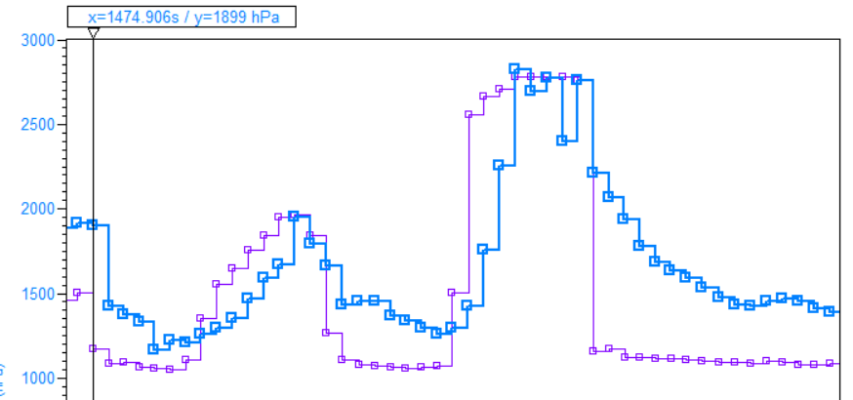
These issues are directly related to
PID regulation. After extensive testing and attempts to calibrate the PID, it became clear that achieving proper control was nearly impossible.
The
core issue was preventing
boost peaks while
smoothing the response and, at the same time, improving the
turbo’s reactivity when the
boost target increases rapidly. I think you try to understand the complexity...
What I Tried:
Copying the PID values from the LS version:
I knew it wouldn’t work perfectly (Because
each PID parameter is dependent on the specific system), but the results were catastrophic. The
boost pressure became completely unstable, even with slight acceleration, and the car
jerked severely.
Softening the LS PID settings:
Despite multiple adjustments, the
jerking persisted. So, I reverted to the
stock PID settings and focused on fixing:
- Constant overboost when cruising
- Boost delay
- Overboost spikes
Testing multiple PID and VNT preposition settings on the stock 2056 PID:
I created and tested
at least 15 different files with adjustments, but nothing led to satisfactory results.
Realizing that
modifying the existing PID settings wasn't effective, I decided to take a different route:
Zeroing out all PID maps. I first attempted to
calibrate the VNT preposition map from scratch. However, even after doing this,
boost pressure remained unpredictable. At
medium and high injection quantities and low RPM (<1800 RPM), the
VNT followed the position target correctly.
But past
1800 RPM for low injection quantities, the
VNT suddenly closed for no apparent reason, deviating significantly from the preposition target and producing a major overboost.
I discovered that a
PID function exists to lower backpressure, so I disabled the
exhaust backpressure regulation PID. However, despite this change, the issue
persisted, and I continued to experience
high boost pressure at partial load, particularly at 130 km/h.
At this point, after weeks of testing, searching in the file, and data-logging the car, it was impossible to just obtain the correct VNT position from the basic preposition map, and I wasn't able to find the problem.
Conducting these kinds of tests is incredibly
frustrating. Every time a new setting results in
poor drivability, it feels like I’m moving further away from the car’s
comfort and intended purpose rather than improving it.
So, because of all these issues, I’ve
given up on the
2260VKLR turbo. If you want your car to perform significantly
harder than the original setup without compromising on
smoke, drivability, or comfort, this turbo is
too difficult to manage.
Maybe it would work for those who
don’t mind a bit of smoke by making the
smoke maps less restrictive to prevent the injection limitation when
boost pressure drops, as I explained earlier.
However, I don’t want to make compromises. My feeling is that,
even though I would have loved to use a ball-bearing turbo, it will be
much easier to build a solid setup with a simple plain-bearing turbo.
If you add to this
difficult calibration the fact that the
22 turbine and hot side are very restrictive, it becomes clear that the
2260VKLR is not well-suited for achieving high performance on the OM642.
I don’t have a
tuned LS version to measure the
backpressure from a 350d Stage 1, but I suspect it would be
higher than 4200 mbar.
Conclusion of the 2260VKLR Adventure
This turbo works without issue if installed in the car
without increasing the stock
1.3-1.4 bar boost pressure of the original
2056 turbo.
Fuel consumption decreases significantly, despite the
constant overboost at partial load.
I recorded
5.6L/100 km on the dash and
5.8L/100 km measured at refueling during a
600 km highway trip at 110 km/h, and I achieved this result multiple times. However, this
changed after I attempted a MAF delete tune. Don't do a MAF delete on this engine. It will lead to
very bad fuel consumption.

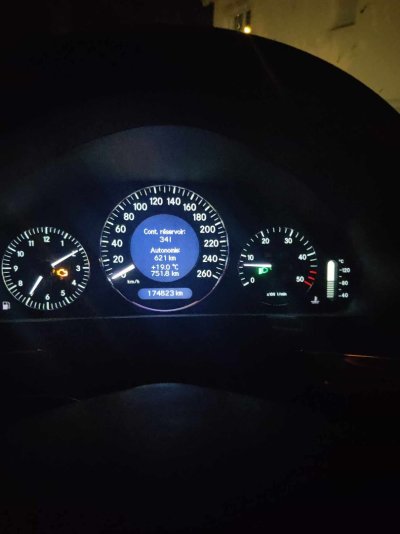
If you look at the
range display, you can see the car showing
34L for 621 km, which is approximately
5.5L/100 km.
In the picture, I had already driven
140 km under different conditions, so don't take the
750 km for 46L into account (the car has an
80L tank).
Unfortunately, I can't find the
original pictures from the first time I achieved this low consumption, nor the
gas station receipt...

You will have to take my words on it this time.
Keep in mind that my
W211 is equipped with
245mm front tires and 265mm rear tires. With
220mm tires, fuel consumption might have been around a real
5.4L/100 km or lower, which I think is great for an E class and V6 diesel engine that produces around 290hp on my car with the 2260VKLR.
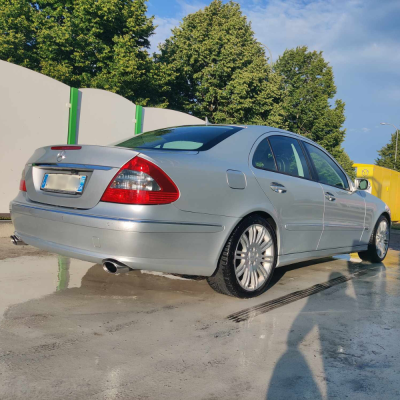
The installation of the
2260VKLR was difficult, and to be honest,
not worth the effort. The
PID issue with a
ball-bearing turbocharger cannot be easily solved. This means that, despite the
ballbearing technology of this turbo,
adapting it to software that isn't designed for it is
practically impossible.
But what’s interesting is that this
turbo runs perfectly on the stock power software, you won’t notice any difference in drivability, and
fuel consumption is significantly lower. On top of that, the
ball-bearing technology is highly reliable, and since the turbo is
water-cooled, it helps
reduce oil coking, making the setup even more appealing.
For now, I’m
keeping it in my car while I work on building a setup that can handle
750Nm with a
manual gearbox and dual-mass flywheel. I won’t clutter
Stevie’s thread with my project updates, but if some are interested, I might
start my own thread later.
At the end, which turbocharger is best ?
It's clear that the
GT22 turbine and the hot side of the 2260VKLR choke the engine and are
too restrictive. A
23 AMG turbine or any
23 turbine with a larger VNT shroud is
necessary to achieve
low backpressure. However, to run at
2.1 bar boost, like
Steve’s car, I believe a
65mm compressor might not be necessary. A
62mm compressor could be sufficient. I need to
confirm which compressor is the most suitable by consulting
compressor wheel manufacturers.
The
spooling performance of a turbocharger is
strongly linked to the compressor wheel size.
The larger the compressor, the slower it spins. Reducing the
compressor size would improve spool time.
Is it worth running more than
2.1 bar boost pressure? I don’t think so. Ultimately, it’s always a question of
reliability.
When tuning
Stevie’s car, I initially thought I had reached the
limit and that the engine might not handle the power. But in reality, the
OM642 seems more capable than many people assume—as long as it’s tuned
carefully, especially in terms of injection
timing. Stevie’s car is still running strong, and believe me, unless you’re
driving in Germany, you
won’t push the car from 100-200 km/h as intensely as he does.
The results from
Saunders have been
very impressive as well. He tuned his car
much more aggressively than we did, and it ran in this tuned state for
several years—until an
exhaust manifold failure destroyed the hybrid turbocharger. Unfortunately, the
exhaust manifold issue spares no one.
Also, I asked
"mirmir69" from
www.mersuforum.net, and by chance, I got an answer, one year before ! I'll share it with you here.
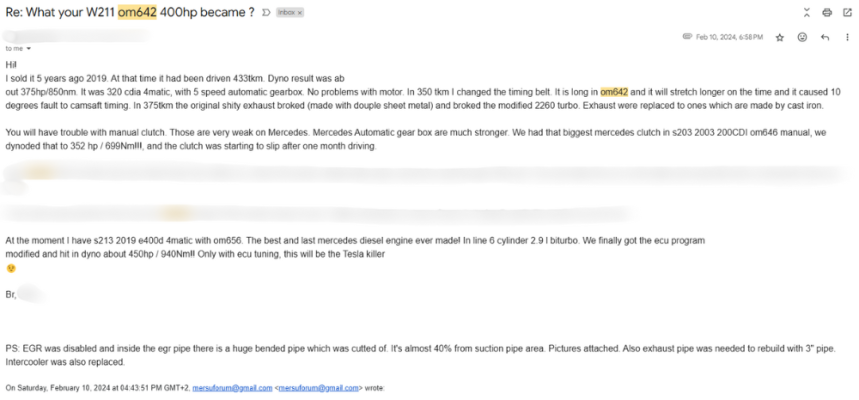
So, in my opinion,
2.1 bar is the best compromise. Many people are frustrated that the
OM642 struggles to exceed 350 hp, but
power figures don’t tell the whole story—it’s about
overall performance.
I even made a
comparison video with two
OM648-powered cars tuned to 400 hp, and Stevie’s car
isn’t far behind at all. Of course, we need to consider that
his CLK is lighter than an E-Class, but still, the
performance is there.
For those curious, here’s the video:
And I want to highlight that the
CLK is equipped with an
intercooler, a hybrid turbo, and an exhaust from a CLK500—nothing fancy.
Future Testing: GT2362V
We need to confirm, but I think a
GT2362V is the best compromise between:
- Spool time
- Maximum boost pressure
- Exhaust backpressure
In the future, I plan to
test this setup after getting confirmation from a
compressor manufacturer regarding the
compression ratio and airflow characteristics of a
62mm compressor.
I believe I can now say that I have
extensive experience with this
engine and ECU. Since I’ve received messages from enthusiasts looking for
high-quality tuning after facing issues with so-called
"professional tuners", here is my
Facebook page if you have a project and would like to contact me :
Log in to Facebook
If I get
enough projects, I will try to be
more consistent in sharing
detailed data on my tunings. Additionally, I’ve worked on
OM648 tuning, aiming to create a
fully calibrated software, just as I did for the
OM642. Surprisingly, despite the
OM648 being more commonly tuned, the
quality of tuning files for this engine
seems even worse than on the
OM642 side...
I hope the information I’ve shared will help some of you
make an informed decision about your
OM642. If you enjoy this kind of project,
let me know, and I’ll be happy to
share more in the future!










